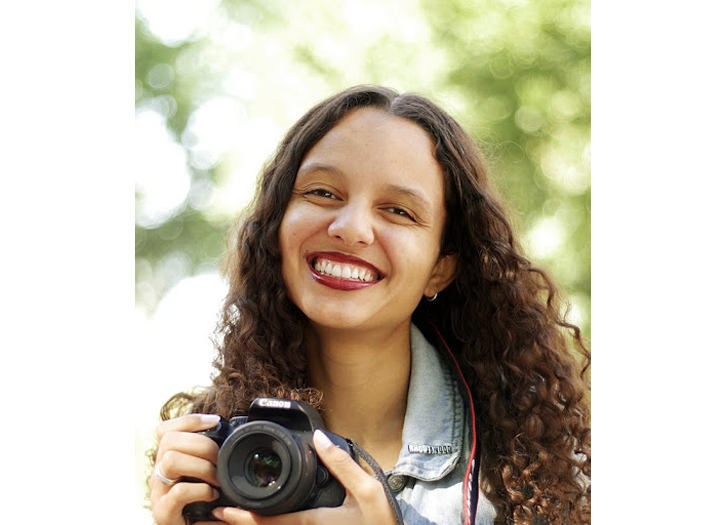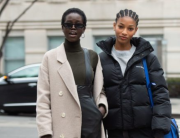Tis the season for great literature. As many are preparing for their holiday shopping, decorating traditions and family gatherings; some are also adding to their personal home libraries. Giving the gift of reading is an exceptional gift for book lovers and children. But many may not be aware of the process that it takes for an author to go from idea to bookshelves. Many face writing challenges, lack of resources, no traditional publishing options, no marketing plan, etc. While others receive profound aha moments in life through their family experiences, careers, communities and hobbies or interests.
For St. Clair Detrick-Jules, she decided to share the natural hair experiences of 100 women in photobook format for the world to see. As a professional photographer and creative this task may not seem large but it was. The author and photographer had an aha moment based on her interaction with her younger sister, Khloe. St. Clair was shocked to discover her younger sister’s interactions of bullying based on her natural hair. So in the truest big sister fashion, St. Clair Detrick-Jules took matters into her own hands. She used her creativity to piece together a collection of empowerment, lifestyle and history in celebration of natural hair from women all over the globe. Here’s what St. Clair shared about her new book, love of literature, publishing process and beyond:
What are your earliest memories of literature?
Before I could read myself, my mom read to me. As is the case for many kids, Good Night Moon, The Very Hungry Caterpillar, and Where the Wild Things Are were staples in our house. A trip to the African Art Museum in DC ended in the giftshop, where my mom bought me A Is for Africa, my first and only alphabet book. I read that book hundreds of times (literally!), and can still remember that “B is for Beads.” These books sparked my imagination and helped me understand that there was a world — or worlds, rather — beyond my little neighborhood in Washington, DC.
My mom planted seeds through literature; she’d read me passages from Sri Nisargadatta Maharaj’s I Am That, and even though I was still too young to understand everything, I understood that there was something magical about books, that there is wisdom to be gained from literature.
When I was in middle school, I had a reading “growth spurt” — I binge-read the entire Harry Potter series (or all the books that had been released at the time, at least) and was captivated by the boy who lived under the stairs; one year at a New Year’s Eve party, I asked my mom to take me home early so I could finish up Harry Potter and the Prisoner of Azkaban. More recently, I just finished Paulo Coelho’s The Alchemist and just started reading Brianna Wiest’s The Mountain Is You.

The publishing journey is unique to each author. What inspired you to become a traditionally published author vs a self-published author?
When I first set out photographing and interviewing Black women about their natural hair stories, I knew nothing about the publishing process. It wasn’t until I was almost done with my first draft of the book that I started researching how to get a book published and found out that if I wanted a traditional publisher, my best bet was to first get an agent. After several months of querying agents and receiving rejection after rejection (“I’m afraid this book just isn’t quite a good fit for me” was a common response), I pivoted and decided I would self-publish; I knew I wanted my book to be out in the world — even if I had to put it out there myself. I designed and formatted the entire book on Adobe InDesign (this took several months), found a printing company (this took a couple months), and ordered a thousand copies of my book (pro tip: don’t order that many copies of your first book!).
My planned self-publication date was May 5th, 2020 — and as we all now know, we were ordered to shelter-in-place in March 2020. I decided to hold off on self-publishing the book and give it a final shot at getting an agent, circling back to the one agent who had given me a little glimmer of hope the previous year — and this time, I was successful. My agent, Rita Rosenkranz, immediately began sending my query and book proposal out to publishers, and pretty quickly got me a book deal with Chronicle Books.
Even though self-published authors generally get to keep all their profits, for me, the benefits of going with a traditional publisher far outweigh the higher profit margin. Chronicle Books took on so many roles: They had a professional editor work with me for several months on revisions, they got my book in brick-and-mortar bookstores across the country (something that felt nearly impossible when I was trying to self-publish), they hired a freelance publicist to work alongside their in-house publicist to help spread the word, and they handled any and all obstacles that popped up along the way. I can honestly say I’m blessed to be working with them!
What advice would you give to an aspiring author who may be struggling with rejection and/or imposter syndrome?
I’ve been in your shoes! It’s easy to get discouraged when we’re being inundated with rejection emails, so I would suggest:
- Surround yourself with people who believe in you and encourage you to keep going, even when you feel like giving up. Love yourself, always.
- Seek feedback from others — there are a ton of free articles online with tips for identifying potential agents, writing query letters, formulating book proposals, and pretty much everything else related to the publishing process.
- Draw inspiration from those who have been in your shoes and succeeded. For example, I recently read the 25th Anniversary Edition of The Alchemist, and in the foreword, author Paulo Coelho explains that his first publisher dropped him because nearly no one was buying his book. However, he believed in himself — and his writing — enough to keep going, and his book has now sold hundreds of millions of copies across the globe.
I’ll end with an old proverb: “What’s meant for you won’t pass you by.”
How has this book publication aided you along your journey with your natural hair and self discovery?
Before I created this book, I’d come to a place of self-acceptance with my hair. I appreciated it aesthetically, and though there were moments when I felt the need to straighten my hair (especially for formal events), I overall had come to tolerate and even like my hair. It wasn’t until I started creating My Beautiful Black Hair, however, that I came to understand my hair as deeply spiritual, ancestral, and political in addition to just aesthetically beautiful. Through intentionally surrounding myself with Black women with natural hair throughout the process of putting my book together, I learned to not just tolerate my hair, but to love it.
As Maya Finoh says in the book, self-love is an active work. It’s an ongoing process, and in a world of Eurocentric beauty standards, we as Black women have to constantly affirm ourselves. There are still very rare and very brief moments when I look in the mirror and wish my hair was straight, but then I draw strength from the words of the women I interviewed; I’m reminded that my hair is a gift from my ancestors, that my hair is a marker of my Blackness and therefore of my strength, that my curls are so strong that centuries of colonialism couldn’t wash them away.
Although I created My Beautiful Black Hair for my little sister Khloe, I’ve come away from the process with an even stronger sense of self-love and pride in my African roots.
What is your sister’s current relationship with her natural hair?
My sister loves her natural hair now! It’s been beautiful to witness her transformation from a four-year-old who used to cry over her afro to a confident eight-year-old who wears her curls with pride, who recognizes the versatility of her crown and wants to try out different styles, and who, when I showed her an advanced copy of My Beautiful Black Hair this past summer, proudly announced “I love my hair because it’s beautiful!”
Just as Khloe has learned to embrace her natural hair through this book, I hope that everyone who picks up a copy of my book — regardless of background — comes away from it with a stronger sense of self-love, strength, and joy.

Spread holiday cheer and Black Girl Magic this season with My Beautiful Black Hair by St. Clair Detrick-Jules. Enjoy the comforting collection of stories that will inspire, transform and commit your lifestyle of embracing your natural texture and hair. Connect with the author for holiday shopping, literary events and more by clicking here.
For more on St. Clair Detrick-Jules, click here.
Follow her on Instagram today.
All images provided by St. Clair Detrick-Jules







Add Comment